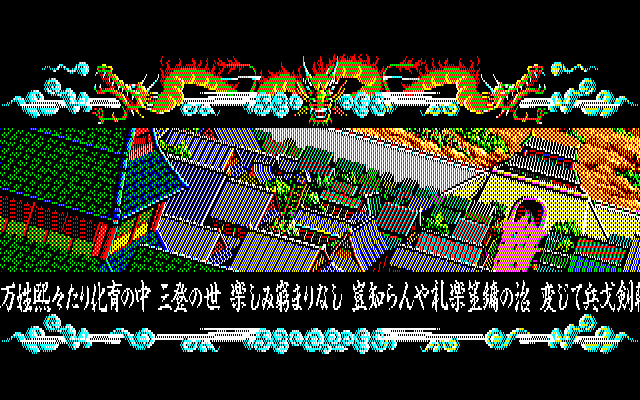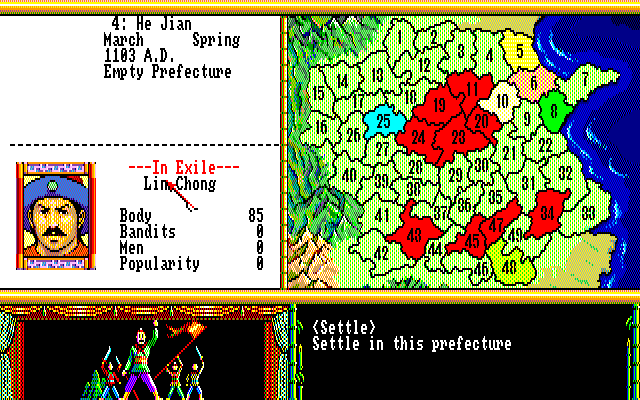Retro Replay Review
Gameplay
Bandit Kings of Ancient China places you at the heart of a sprawling military strategy experience set during the fall of the Northern Song Dynasty. You begin as an exiled ruler, stripped of lands and titles, and must rebuild your reputation by conquering minor prefectures and gathering loyal officers. Each territory offers unique resources—grain, gold, and manpower—that are critical to strengthening your forces. Managing these assets effectively lays the foundation for your eventual confrontation with Imperial Minister Gao Qiu, who currently holds the throne of the newly formed dynasty.
(HEY YOU!! We hope you enjoy! We try not to run ads. So basically, this is a very expensive hobby running this site. Please consider joining us for updates, forums, and more. Network w/ us to make some cash or friends while retro gaming, and you can win some free retro games for posting. Okay, carry on 👍)
The core loop revolves around raising your personal statistics—leadership, war ability, intelligence, and politics—through battles, diplomacy, and training. Skirmishes range from small-scale ambushes in mountain passes to full-scale sieges of walled cities. Officers under your command develop loyalties and rivalries, and their individual traits can influence the outcome of engagements. Diplomacy plays a vital role, too: forging alliances with nearby warlords or swaying neutral prefectures can tip the balance in your favor.
As you expand your domain, the game gradually lifts restrictions on attacking Gao Qiu’s home territory. This progression ensures you never feel overwhelmed at the start and gives you room to experiment with different tactics. The turn-based map interface clearly displays enemy positions, supply lines, and the political landscape, allowing for careful planning. While patience is often rewarded, the AI can spring unexpected rebellions or ambushes, keeping you on your toes and reinforcing the sense of a living, breathing world.
Graphics
By modern standards, Bandit Kings of Ancient China features retro pixel art and simple sprites, but it excels at delivering clear and functional visuals. The province map is rendered in muted earth tones, with icons denoting forts, cities, and highways. This minimalistic style ensures that key information—such as troop movement, supply routes, and territorial borders—is always easy to decipher, even in the heat of multiple engagements.
Character portraits appear during diplomatic negotiations and story events, providing a touch of personality to your officers and rivals. While the illustrations are not highly detailed, they convey enough expression to make each figure memorable. Animations during battles are kept brief, showing troops clashing or arrows raining down, which helps maintain the game’s pacing rather than bogging it down with lengthy sequences.
Menus and UI panels are straightforward and responsive, guiding you through recruitment, training, and the management of your fiefdom. Pop-up event windows display crucial narrative moments—such as receiving word of a southern rebellion or forging an alliance with a neighboring prefecture—and the text is easy to read. Overall, the presentation prioritizes clarity and usability, ensuring that strategic decisions never get lost in overly elaborate visuals.
Story
The narrative backdrop of Bandit Kings of Ancient China is rooted in the historical turmoil of the 12th century. Emperor Hui Zhong’s reign is threatened by the machinations of Gao Qiu, an imperial minister who orchestrates a rebellion that topples the Song Dynasty. As Gao Qiu ascends to power, the rightful emperor—Hui Zhong—is forced into hiding, and loyalists across the realm are hunted down or corrupted.
You assume the role of one such exiled noble, determined to restore Hui Zhong to the throne. The game’s storytelling unfolds primarily through text-based events, letters from allies, and occasional cutscenes. While there is no fully voiced dialogue, the vivid descriptions and period-appropriate language bring the intrigue of court politics to life. Missions often involve rescuing captured officers, thwarting assassinations, or smuggling supplies to loyalist forces.
Emergent storytelling is also a highlight: your personal journey from a nameless outlaw to the rallying point for a nationwide rebellion creates a sense of ownership over the historical drama. Allies you recruit may rise to become powerful generals or betray you if their morale falters. These unscripted twists lend an unpredictable quality to the overall narrative, making every playthrough feel distinct.
Overall Experience
Bandit Kings of Ancient China is a rewarding blend of strategy, role-playing, and historical drama. While the graphics and interface may feel dated, the depth of gameplay shines through its robust character development, dynamic AI, and meaningful diplomatic options. The learning curve can be steep, especially for newcomers to grand strategy titles, but the payoff is substantial when you finally lead a coalition against Gao Qiu’s stronghold.
The game’s pacing encourages careful planning and long-term vision. There are moments of intense tactical decision-making—like choosing whether to march on a fortified city or starve it out—and other stretches where you focus on economic development and officer training. This ebb and flow keeps the experience from feeling one-dimensional. Veteran players of Koei’s classics will recognize familiar mechanics but will appreciate the unique focus on internal rebellion rather than outright empire building.
For potential buyers interested in historical strategy with a strong narrative core, Bandit Kings of Ancient China offers a deep, engaging challenge. Its blend of political intrigue, character-driven storytelling, and strategic depth provides hours of engrossing gameplay. If you’re seeking a title that rewards patience and strategic foresight, this Koei gem is well worth your time.
 Retro Replay Retro Replay gaming reviews, news, emulation, geek stuff and more!
Retro Replay Retro Replay gaming reviews, news, emulation, geek stuff and more!









Reviews
There are no reviews yet.